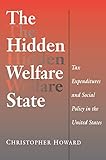The Hidden Welfare State : Tax Expenditures and Social Policy in the United States / Christopher Howard.
Material type: TextSeries: Princeton Studies in American Politics: Historical, International, and Comparative Perspectives ; 171Publisher: Princeton, NJ : Princeton University Press, [1999]Copyright date: ©1997Edition: Course BookDescription: 1 online resource (272 p.) : 7 tablesContent type:
TextSeries: Princeton Studies in American Politics: Historical, International, and Comparative Perspectives ; 171Publisher: Princeton, NJ : Princeton University Press, [1999]Copyright date: ©1997Edition: Course BookDescription: 1 online resource (272 p.) : 7 tablesContent type: - 9780691005294
- 9781400822416
- 336.2060973
- HJ2381 .H684 1997
- online - DeGruyter
- Issued also in print.
| Item type | Current library | Call number | URL | Status | Notes | Barcode | |
|---|---|---|---|---|---|---|---|
 eBook
eBook
|
Biblioteca "Angelicum" Pont. Univ. S.Tommaso d'Aquino Nuvola online | online - DeGruyter (Browse shelf(Opens below)) | Online access | Not for loan (Accesso limitato) | Accesso per gli utenti autorizzati / Access for authorized users | (dgr)9781400822416 |
Frontmatter -- Contents -- Tables -- Acknowledgments -- Abbreviations -- Part One. Overview -- Introduction -- Chapter 1. Sizing Up the Hidden Welfare State -- Part two: Origins -- Introduction -- Chapter 2. Home Mortgage Interest and Employer Pensions -- Chapter 3. Earned Income Tax Credit -- Chapter 4. Targeted Jobs Tax Credit -- Part three. Development -- Introduction -- Chapter 5. Home Mortgage Interest -- Chapter 6. Employer Pensions -- Chapter 7. Earned Income Tax Credit -- Chapter 8. Targeted Jobs Tax Credit -- Part four: Conclusion -- Chapter 9. Politics of the Hidden Welfare State -- Appendix: List of Interviews -- Appendix: Notes -- Appendix: Index
restricted access online access with authorization star
http://purl.org/coar/access_right/c_16ec
Despite costing hundreds of billions of dollars and subsidizing everything from homeownership and child care to health insurance, tax expenditures (commonly known as tax loopholes) have received little attention from those who study American government. This oversight has contributed to an incomplete and misleading portrait of U.S. social policy. Here Christopher Howard analyzes the "hidden" welfare state created by such programs as tax deductions for home mortgage interest and employer-provided retirement pensions, the Earned Income Tax Credit, and the Targeted Jobs Tax Credit. Basing his work on the histories of these four tax expenditures, Howard highlights the distinctive characteristics of all such policies. Tax expenditures are created more routinely and quietly than traditional social programs, for instance, and over time generate unusual coalitions of support. They expand and contract without deliberate changes to individual programs. Howard helps the reader to appreciate the historic links between the hidden welfare state and U.S. tax policy, which accentuate the importance of Congress and political parties. He also focuses on the reasons why individuals, businesses, and public officials support tax expenditures. The Hidden Welfare State will appeal to anyone interested in the origins, development, and structure of the American welfare state. Students of public finance will gain new insights into the politics of taxation. And as policymakers increasingly promote tax expenditures to address social problems, the book offers some sobering lessons about how such programs work.
Issued also in print.
Mode of access: Internet via World Wide Web.
In English.
Description based on online resource; title from PDF title page (publisher's Web site, viewed 30. Aug 2021)


